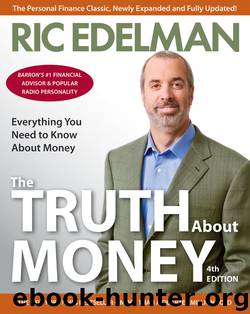The Truth About Money by Ric Edelman

Author:Ric Edelman
Language: eng
Format: epub
Publisher: HarperCollins
What to Do If You Are a Victim of Identity Theft
Thieves who assume your identity work quickly to drain your bank and investment accounts and borrow money in your name. By the time you discover the theft — which can take months or even years — you might have lost hundreds or even thousands of dollars, and you may spend months or years untangling the web of mischief the thieves created. Until you clean up the mess, your credit report is likely to be in tatters; cashiers may treat you like a thief, and you will make dozens of phone calls in an attempt to straighten things out.
In spite of your best efforts, you may still become a victim. Therefore, prevention is not enough. You must also vigilantly monitor the following:
1. Bank and credit card accounts. By the time you learn that you’ve bounced a check or are informed that your credit card limit has been exceeded, the damage is already done. Unfortunately, most financial institutions use U.S. mail to notify you; few phone or email you. This delay can make the problem worse. To protect yourself, minimize the number of bank and credit card accounts you hold, and check the balances regularly. Most allow you to do this through automated telephone menus or the Internet.
2. Mail service. Know your billing and statement cycles. Bank, investment, and credit card statements that fail to arrive on time might have been stolen. Thieves could have raided your mailbox, found an old statement in your trash, or gleaned information from your check or credit card number when you used it in a store or restaurant. However they got it, they sometimes use the data to submit a fraudulent change of address form with the institution. They might create fake checks on their computers, or they might shop with a fake card that carries your number. So, if your mail is late, investigate.
3. Your credit report. Ideally, you’d look at it weekly to see if any accounts have been opened in your name without your knowledge or if any of your legitimate accounts show unauthorized activity. Weekly is ideal because someone who steals your identity will cause extensive damage during the first week to ten days. But let’s get real — nobody looks at their credit report that often due to the time and effort involved. So, examine yours at least annually. And if you see old accounts listed that you no longer use, close them.
Someone Has Stolen Your Identity — Now What?
If someone has forged a check on your account, laws in most states hold banks responsible for any loss. However, you must notify financial institutions about the problem in a timely manner. If someone illegally uses your credit card, your maximum liability for each account is $50 if you report it within 50 days. Debit cards are another matter: Your liability is $50, but only for the first two days after the card is lost or stolen. Your liability increases to $500 for the next 58 days, and after 60 days, your liability is unlimited.
Download
This site does not store any files on its server. We only index and link to content provided by other sites. Please contact the content providers to delete copyright contents if any and email us, we'll remove relevant links or contents immediately.
The Compound Effect by Darren Hardy(8974)
Tools of Titans by Timothy Ferriss(8402)
Nudge - Improving Decisions about Health, Wealth, and Happiness by Thaler Sunstein(7711)
Win Bigly by Scott Adams(7202)
Deep Work by Cal Newport(7089)
Rich Dad Poor Dad by Robert T. Kiyosaki(6642)
Principles: Life and Work by Ray Dalio(6457)
Pioneering Portfolio Management by David F. Swensen(6303)
Digital Minimalism by Cal Newport;(5767)
The Barefoot Investor by Scott Pape(5750)
Grit by Angela Duckworth(5617)
The Slight Edge by Jeff Olson(5420)
Discipline Equals Freedom by Jocko Willink(5391)
The Motivation Myth by Jeff Haden(5214)
You Are a Badass at Making Money by Jen Sincero(4934)
The Four Tendencies by Gretchen Rubin(4606)
Eat That Frog! by Brian Tracy(4543)
The Confidence Code by Katty Kay(4265)
Bullshit Jobs by David Graeber(4195)
